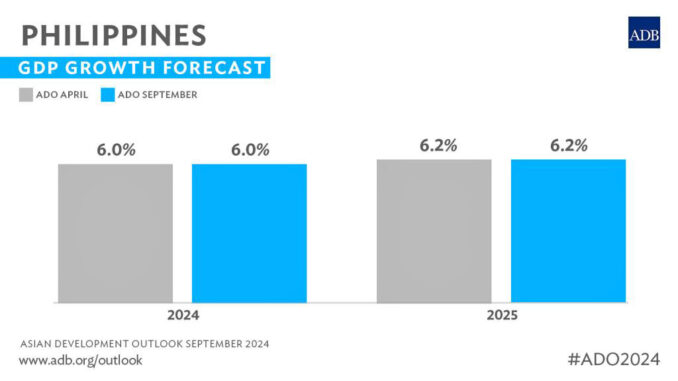
The Asian Development Bank (ADB) maintained its growth forecast for the Philippines, citing lower inflation, monetary easing and sustained public spending on infrastructure.
The ADB, in its Asian Development Outlook (ADO) September 2024 report, kept its growth forecasts for the Philippine economy at 6 percent in 2024 and 6.2 percent in 2025.
It said “the expansion in gross domestic product [GDP] will be driven by broad-based domestic demand, supported by lower inflation and interest rates.”
The government expects the GDP growth to fall within a range of 6 percent to 7 percent this year and 6.5 percent to 7.5 percent next year.
The ADB reduced its inflation forecast to 3.6 percent in 2024 from its April estimate of 3.8 percent, reflecting the sustained deceleration in food prices partly due to lower tariffs on rice imports.
Inflation is expected to ease further to 3.2 percent in 2025 from the previous estimate of 3.4 percent.
“Most of the ingredients for the Philippines’ sustained economic growth are in place—rising government revenues are boosting public expenditures on infrastructure and social services, increasing employment is driving consumption and reforms to open the economy to more investments are underway,” ADB Philippines country director Pavit Ramachandran said.
“With inflation slowing, the country is in a strong position to lead growth in Southeast Asia,” he said.
The ADB said, however, risks remain from potential severe weather events which could drive inflation higher. External factors such as a sharper slowdown in major advanced economies and the People’s Republic of China, financial volatility due to US monetary policy decisions, geopolitical tensions and rising global commodity prices also pose threats to growth, the report said.
The government expects public infrastructure spending to range between 5 percent and 6 percent of GDP annually from 2024 to 2028, after hitting 5.8 percent of GDP in 2023.
The government’s “Build Better More” infrastructure program includes 66 ongoing projects and another 31 approved for implementation as of August 2024.
The infrastructure program aims to enhance physical connectivity through railways, bridges, and airports, or strengthen water management through irrigation, water supply, and flood control. Climate change mitigation and adaptation, digital connectivity, energy, and agriculture projects, are also prioritized under this program.
ADB is financing key infrastructure projects such as the Manila Clark Railway Project and the South Commuter Railway Project which will link Metro Manila to northern and southern provinces in the Luzon region.
It is also supporting the Bataan-Cavite Interlink Bridge Project and the Integrated Flood Resilience and Adaptation Project which aims to enhance flood and climate change resilience in three major river basins in the country.


Be the first to comment